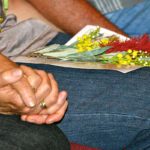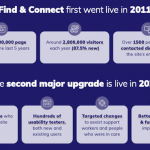The next Find & Connect?
- Jun 3, 2016
- In Features
The past few years have seen massive public attention relating to children in immigration detention whether on the Australian mainland or offshore in places like Nauru. While it would be folly to argue the plight of Forgotten Australians, ‘Care’ Leavers and Former Child Migrants is identical to that of children who are in or have experienced immigration detention there are some disturbing similarities. Children have been placed in institutional settings where systematic abuse has been occurring and where we know significant harm is being done.
On 31st March 2016, the Government released statistics that revealed 50 children were detained in Nauru, 17 children were detained in centres and 317 children in community detention within Australia.

There have been concerns for children’s safety, health and well-being in detention for some time. The 2014 Forgotten Children report showed that “…immigration detention is a dangerous place for children” and referenced data describing “numerous incidents of assualt, sexual assault and self-harm.” The health and well-being of children in immigration detention report from 2015 provided further evidence:
[There are] Universal concerns about safety even within the compound. Most reported they would not leave the compound even though it is now open access. As above most women/children would not go to toilet/shower block alone. One man said that since the policy change to allow free access his friends in Nauru report “No one is going outside because it is not safe. Dangerous after 6pm. Poor control by police –assault, theft, alcohol, rape.”

Advocacy group End Immigration Detention of Children claim in the 15 month period, January 2013 – March 2014, there were 233 assaults involving children, 33 reported incidents of sexual assault involving children and 128 incidents of children self-harming. In terms of the health impacts of immigration detention on children many doctors and other health care professionals have risked imprisonment and spoken out about the conditions children face. Legally they are being silenced by legislation, such as the Australian Border Act which bars health professionals from speaking out about the welfare of children.
Media access is also essentially if not technically barred. Visiting offshore detention centres has proved so difficult even United Nations Representatives have been turned away, although the Government denies it was involved in this decision (Cox and Whyte, 2014) and the Guardian Australia has reported a prohibitive $8000 application fee for foreign journalists to enter Nauru.
There is a lack of public information and it seems a lack of information for people inside the system. How will these children make sense of what has happened to them? What records and documents will survive of their experiences? Will there need to be a Find & Connect for these children? The Government is proclaiming the number of children in detention is falling but the children who have passed through the system, at least 167 of whom were born in detention, have already experienced the trauma.
These factors lead me to question whether we will be facing another Royal Commission and apology in the years to come. Where we acknowledge again the abuse of some of the most vulnerable individuals in the world at the hands of successive Australian governments. In ending I include a quote from a former senior charity worker that has stayed with me since I began exploring this area:
I wake up in the middle of the night in a cold sweat, worried that one day we may have to face a royal commission and have to answer for the conditions under which these people were treated and which we didn’t have the guts to challenge the government on.”
Further References
Select Committee on the Recent allegations relating to conditions and circumstances at the Regional Processing Centre in Nauru, 31 August 2015, ‘Taking Responsibility: Conditions and Circumstances at Australia’s Regional Processing Centre in Nauru’ Parliament of Australia http://www.aph.gov.au/Parliamentary_Business/Committees/Senate/Regional_processing_Nauru/Regional_processing_Nauru/Final_Report
Cox, Lisa and Whyte, Sarah, 9 April 2014, ‘UN investigators denied access to Nauru detention centre’, Sydney Morning Herald, http://www.smh.com.au/federal-politics/political-news/un-investigators-denied-access-to-nauru-detention-centre-20140409-zqspk.html
Farrell, Paul and Doherty, Ben, 8 October 2015, ‘Nauru lets local journalists into centre but keeps $8,000 fee for foreigners’, The Guardian, http://www.theguardian.com/australia-news/2015/oct/08/nauru-lets-local-journalists-into-centre-but-keeps-8000-fee-for-foreigners
Davies, Julie-Anne 15 November 2013, ‘Abbott’s New World Order’, The Sydney Morning Herald, Online, http://www.smh.com.au/federal-politics/political-news/abbotts-new-world-order-20131114-2xji4.html
Unknown, c2016, ‘ChilOut: Children Out of Immigration Detention’, http://www.chilout.org/
Unknown, 6 January 2016, ‘Information about children in immigration detention’, Australian Human Rights Commission, https://www.humanrights.gov.au/information-about-children-immigration-detention
ABC, 3 March 2016, ‘Fact Check: Has the number of children in detention dropped from 2000 to about 75 under the Coalition’, ABC Fact Check, http://www.abc.net.au/news/2016-02-25/fact-check-children-in-detention/7149720
Unknown, c.2016, End Child Detention, http://endchilddetention.org/australia/
Australian Human Rights Commission, 2015, The Health and well-being of children in immigration detention: Report to the Australian Human Rights Commission Monitory Visit to Wickham Point Detention Centre, Darwin, NT October 16th-18th 2015 https://www.humanrights.gov.au/sites/default/files/document/publication/Health%20and%20wellbeing%20of%20children%20in%20immigration%20detention%20report.pdf
Author: Elizabeth Daniels
Elizabeth is writing her PhD on critical poststructuralist theory and participatory appraisal using the asylum seeker situation as a case study at Monash University. She previously worked on the Find & Connect Records Access Documentation Project.






Helen Skerman
September 1, 2016 1:40 pmSuch unconscionable conduct by a government cannot be allowed to continue. When is the Australian Government going to be held accountable……and how?
Frank Golding
August 1, 2016 8:59 amThanks for this post. The similarities with Care Leavers is blindingly obvious. The damage done to a child by prolonged incarceration is so well-known that you have to wonder that politicians who support this form of control must in their quiet moments wonder if one day a royal commission will put them on the stand and call them to account for their morally reprehensible actions.